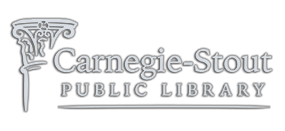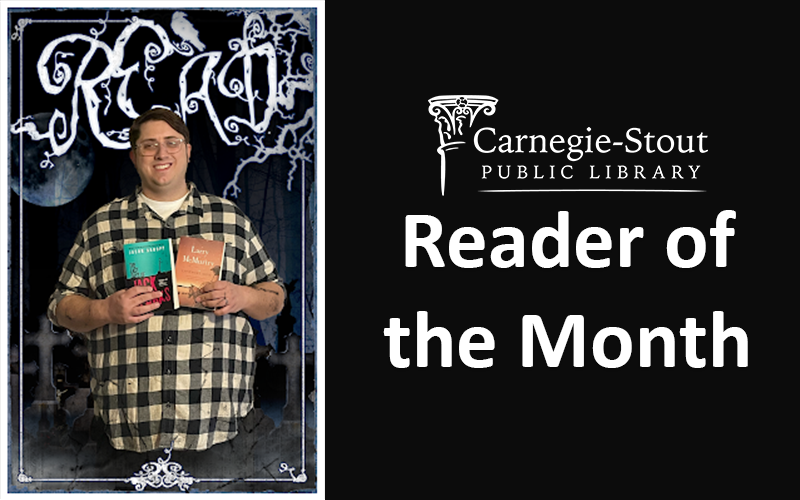Check out Ben Maher-Jacobson’s book list!
Apply to be the next C-SPL Reader of the Month!
About Ben
I am a marketing writer and freelance journalist. Before making an unexpected mid-pandemic career shift, I spent 10 years working as a newspaper reporter, editor and columnist. I have a wonderful wife, three poorly behaved dogs, two bunnies and a chinchilla.
I read primarily for entertainment, so I’m a big fan of thrillers and genre novels, particularly horror and science fiction. I also love to laugh, so I dig humorous fiction and non-fiction. For example, my love for Dave Barry’s humorous essays was a big reason I began working in newspapers.
Q & A
Q. What is the best book you have read within the last year (or ever)?
A. The best book I read in 2020 was The Ruins, by Scott Smith. It’s about a group of young, adventurous tourists who stumble upon an archaeological site in Mexico. Naturally, things go horribly wrong and they are picked off, one by one, by murderous vines capable of imitating human speech. It might sound ridiculous, but it’s fast-paced and incredibly tense. And while the narrative shifts between viewpoints regularly, there are no chapter breaks to be found. Basically, it’s one nonstop nightmare until the satisfying – but not necessarily happy – ending.
Q. What is your ideal reading environment (location, sound, snacks, etc.)?
A. We have a little library in our home. We have two squashy armchairs, either of which make an ideal spot for some Sunday morning reading. I like to park myself in a chair with a glass of diet soda, let one of the dogs jump up into my lap and then spend a few hours vegetating. That said, books, in my opinion, have such great value because of their versatility. Any location can be an ideal reading spot, as long as you’ve got the time, the space and enough light to make out the words on the page.
Q. What book are you most excited about reading next, and what about it is most exciting?
A. I’m considering going through H.P. Lovecraft’s catalogue. I’ve avoided his work for years because I’ve heard so much about the author’s virulent racism. But I’ve really enjoyed a few Lovecraft-adjacent books recently – including the excellent Lovecraft Country, by Matt Ruff – that combine the eldritch horrors for which the author was famous with real-life social and political issues. I’d really like to check out the source material firsthand, especially now that I’ll be doing so as a reader who is more aware of the social and historical context in which Lovecraft operated.
Q. What book do you think more people should read, and why do you think they should read it?
A. Any fan of horror fiction must check out Adam Nevill. Like, right now. He’s fairly big in the U.K., but I don’t think he’s quite penetrated the American literary market in the same way. Which is crazy. The man writes the most descriptive, horrifying prose I’ve ever read. It’s dark, frequently disgusting, and so incredibly unnerving you have to read it to believe it.
Fortunately, I think Nevill’s day is coming in the United States. He wrote the book on which Netflix’s The Ritual was based, and the streaming service plans to debut an adaption of Nevill’s No One Gets Out Alive later this year. More attention to this incredible horror author can only be a good thing.
Q. What book has been the most challenging for you to read? How did it challenge you?
A. Reading is fun escapism for me. Any book can provide opportunities for introspection and personal growth, but I’d really rather just focus on monsters and jokes and explosions and the like. It’s rare that I’ll pick a book specifically for the challenge of it or to enrich myself or whatever.
Personally, I blame Wuthering Heights. While I don’t find it as insufferable as Madame Bovary (I changed my college major from English to communications after being forced to read that supposed “masterpiece”), Wuthering Heights completely soured me on anything that might even tangentially be considered classic literature.
Perhaps it’s because I first was forced to read it as an angsty and romantically frustrated 16-year-old, so the love triangle at the center of the book hit a bit too close to home. Or maybe it just didn’t have enough explosions. Either way, I was forced to read Wuthering Heights repeatedly over the course of my education, and I found new reasons to loathe it every time.
Q. When do you decide to stop reading a book? In other words, do you read every book to the last page, or is there a moment when you decide to stop?
A. For me, it’s all about the characters. Are they behaving in a way that is consistent with everything I’ve read and learned so far? Are they interesting and relatable? Is the dialogue believable, or at least in line with the overall tone of the narrative?
Once I’ve lost my grip on a character in a book, it can be really tough to come back. To me, that suggests that an author didn’t have a cohesive vision for their work. I want my stories to have defined beginnings, middles and ends. And you can’t have a satisfying and complete narrative if the characters aren’t realistic or, at the very least, true to themselves and the reality in which they exist.
Q. Do you remember when your love for reading began?
A. I was fortunate to have very loving grandparents who made sure to read to my brother and I each and every night before bedtime. I’ve been a professional writer for more than a decade now, and my grandparents deserve much of the credit. Or blame.
Check out Ben Maher-Jacobson’s book list!
Apply to be the next C-SPL Reader of the Month!

